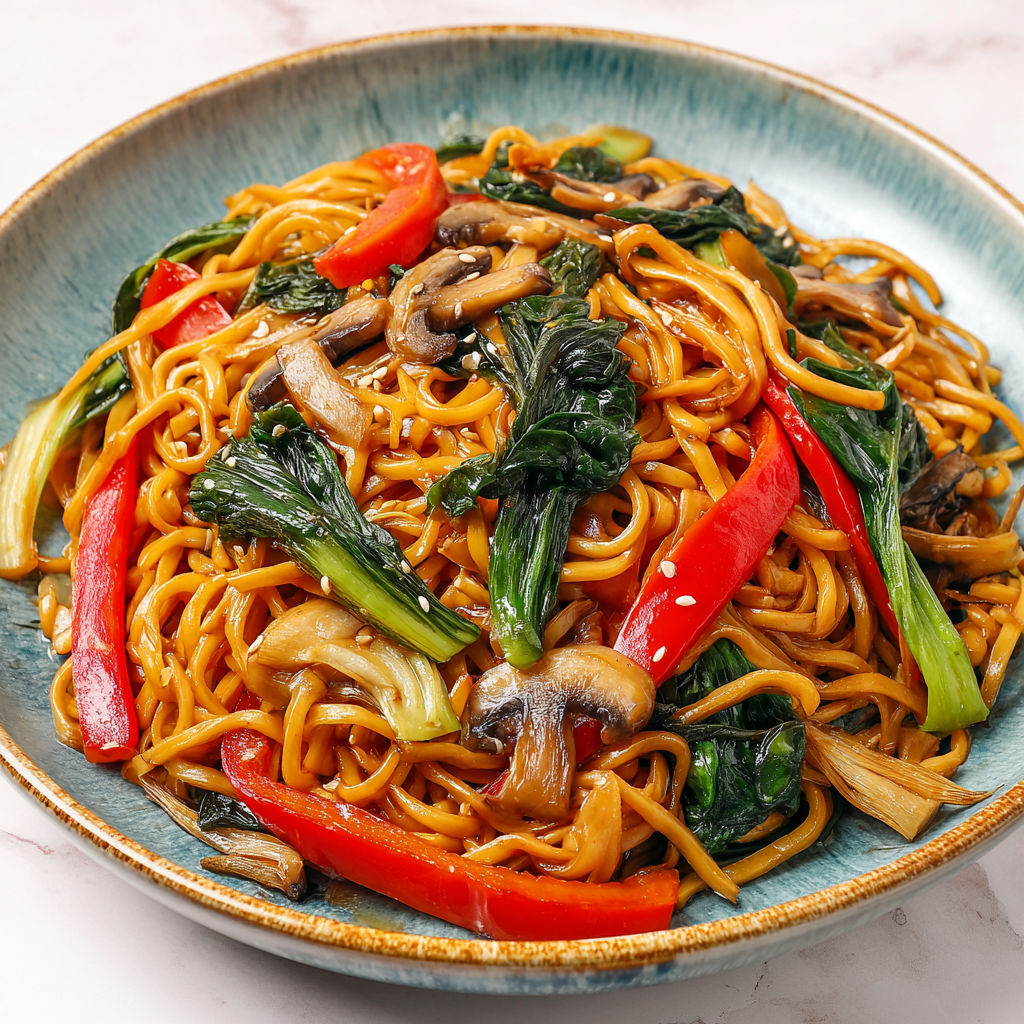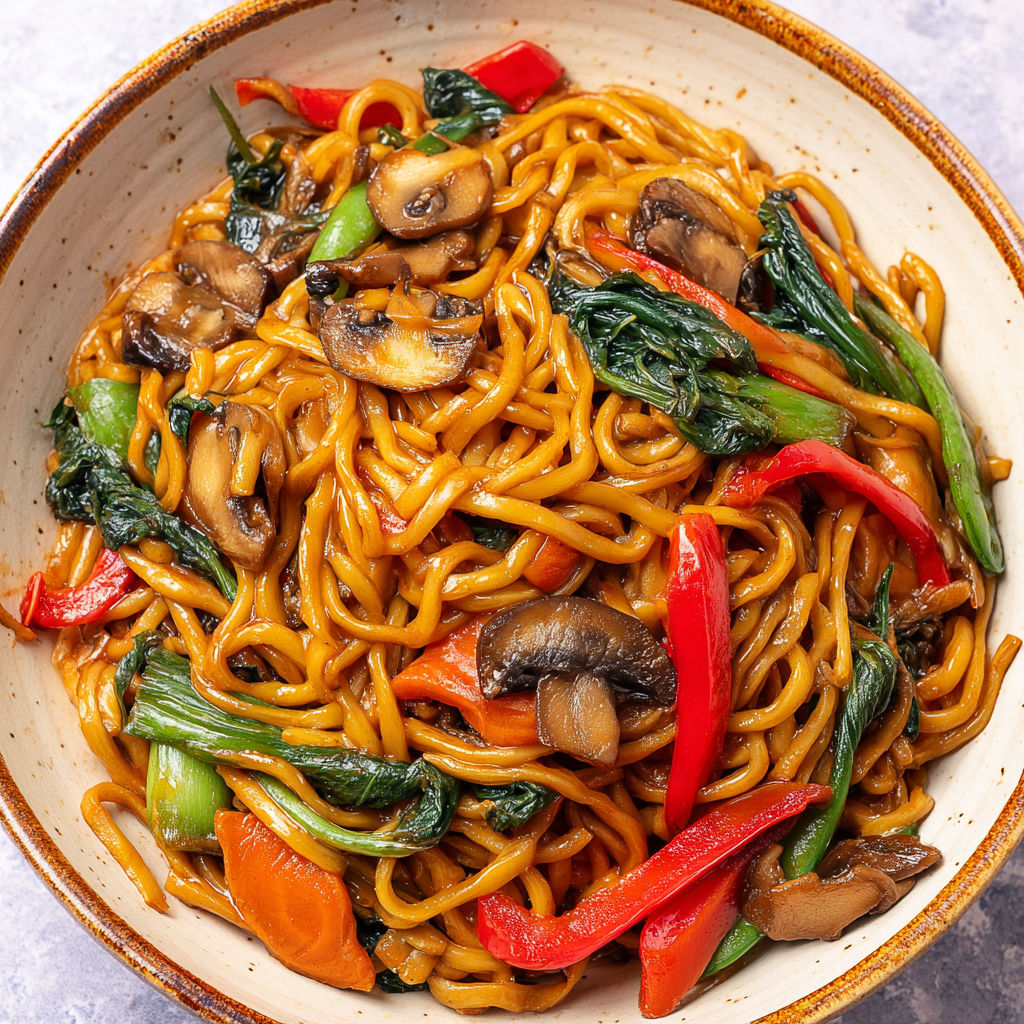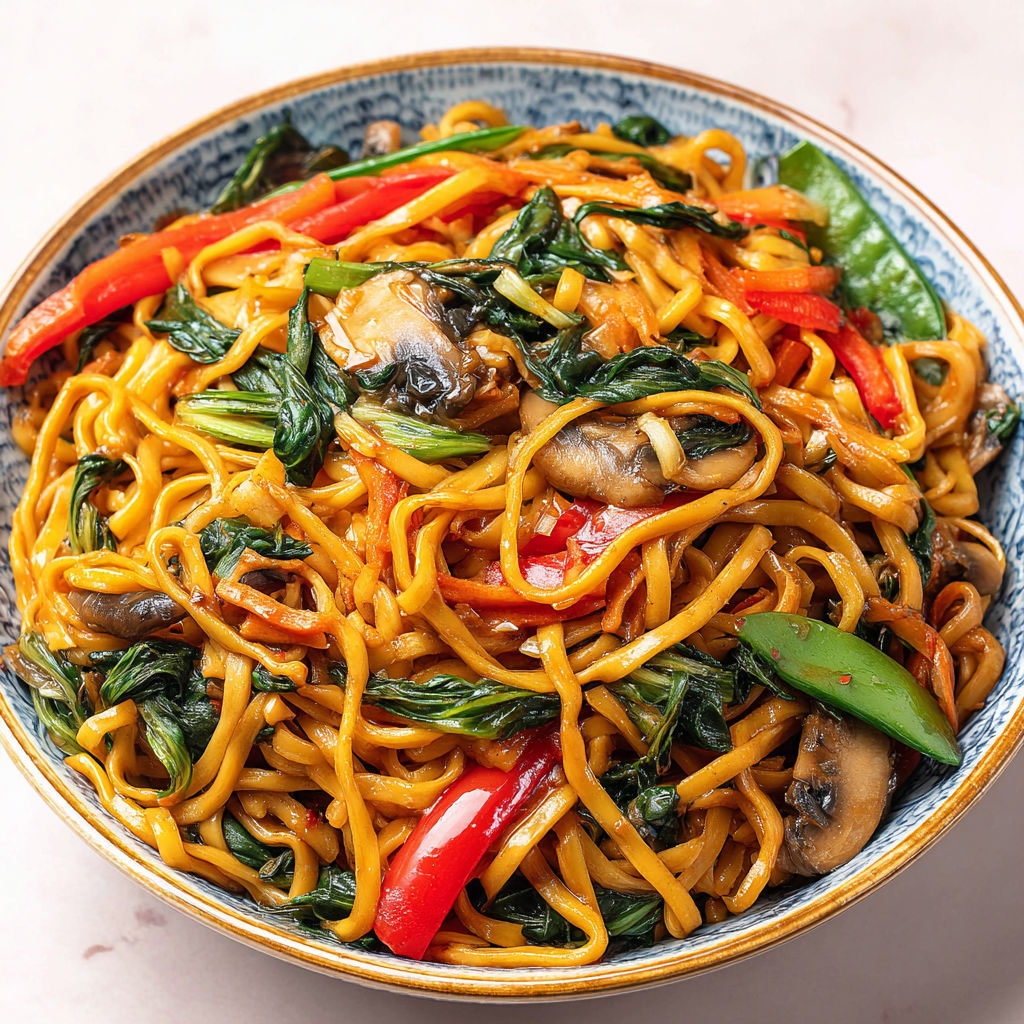 Save
Save
This 15 Minute Vegan Veggie Lo Mein is perfect for busy weeknights when you want a quick, healthy, and satisfying meal that does not skimp on flavor. It comes together fast using fresh vegetables and simple pantry staples, capturing that classic Asian takeout taste without any animal products. Whether you are new to vegan cooking or just need a speedy dinner idea, this recipe hits the spot every time.
I first made this during a hectic week and loved how I could throw it together between calls. Now it’s a staple that my whole family requests regularly for its freshness and comforting flavors.
Gather Your Ingredients
- Vegan lo mein noodles or long noodles such as whole wheat spaghetti or soba noodles: to keep it plant based and flexible to what you have
- Fresh garlic: provides a sharp aromatic base, minced or grated for maximum flavor release
- Fresh ginger: adds a bright, warm zing; using a microplane helps spread its flavor evenly
- Red bell pepper: brings sweetness and crunch; look for firm peppers with glossy skin
- Carrots: add color and natural sweetness; matchstick cuts ensure quick cooking
- Snow peas: possess a delicate snap and mild sweetness; trim ends for better texture
- Sliced mushrooms: contribute umami and texture; baby bella or cremini work well
- Green onions: give a mild onion flavor and pop of green; cut into one inch pieces
- Leafy greens such as bok choy, spinach, kale or chard: add earthiness and nutrients; choose fresh, crisp leaves
- Reduced sodium soy sauce or tamari: keeps sodium in check but delivers savory depth
- Dark soy sauce, optional: for added umami and color
- Toasted sesame oil, optional: lends a nutty richness that enhances the sauce
- Coconut sugar or similar sweetener: balances salty and tangy components
- Rice vinegar or apple cider vinegar: introduces brightness and acidity
- Tahini, optional: adds body and creaminess to enrich the sauce
- Ground ginger: for additional spice and warmth
How to Make It
- Cook noodles:
- Start by bringing a large pot of water to a boil. Cook the noodles according to the package instructions until just tender but not mushy. Once done, drain and rinse the noodles with warm water to remove excess starch and prevent sticking. Keep them set aside in a strainer while you prepare the veggies.
- Cook veggies:
- While your water is heating, begin cooking the vegetables so everything finishes close together and stays fresh and vibrant.
- Cook aromatics:
- Heat a large nonstick skillet over medium high heat. Add a splash of avocado oil or another neutral high heat oil to prevent sticking. If you avoid oil, use water or vegetable broth instead. Add the minced garlic and grated ginger. Stir constantly and cook for about one minute until fragrant but not browned. This step builds a flavorful aromatic base that carries the dish.
- Add bell peppers and carrots:
- Add the sliced red bell peppers and matchstick carrots to the skillet. Stir and cook them for one to two minutes so they start to soften while retaining some crunch.
- Add snow peas and mushrooms:
- Next add the snow peas and mushrooms to the pan. If you are using hearty greens like kale or chard that take longer to cook, add those now as well. Stir everything frequently and cook for about three to five minutes until the mushrooms are slightly browned and the vegetables tender crisp.
- Add leafy greens:
- Add the sliced green onions and the leafy greens such as bok choy or spinach at this point. Stir and cook for another one to two minutes just until the greens have wilted but still look bright and fresh.
- Make sauce:
- In a small bowl or measuring cup, whisk together the reduced sodium soy sauce, dark soy sauce if using, toasted sesame oil, tahini, rice vinegar, coconut sugar, and ground ginger. This sauce balances umami, sweetness, acidity, and spice perfectly.
- Combine:
- Pour half of the sauce over the cooked vegetables and stir to coat evenly. Then add the drained noodles to the pan. Gently toss them with tongs or fold with a spatula to mix everything thoroughly. Pour over the remaining sauce and toss again until all noodles and veggies are well coated and glossy with sauce.
- Serve:
- Serve the lo mein immediately for best texture and flavor. Sprinkle with toasted sesame seeds or red pepper flakes if desired to add texture and heat.
- Store:
- Leftover vegan veggie lo mein can be stored in an airtight container in the refrigerator for up to four days. Gluten-free noodles may not hold up as well so adjust expectations accordingly.

One of my favorite ingredients to use in this dish is the toasted sesame oil because it adds such a warm, nutty note that feels luxurious despite how simple the dish is. I remember the first time I added it by accident instead of plain sesame oil and was hooked on the flavor. This simple step really elevated the recipe and made it feel more special during weeknight dinners.
Flavor Boosters
Sprinkle with toasted sesame seeds or red pepper flakes for extra texture and heat to enhance the savory and sweet balance of the dish.
Serving Suggestions
Serve this vegan lo mein as a main dish on its own or paired with simple sides like steamed edamame or a crisp cucumber salad. Garnish with thinly sliced fresh chilies or use as a filling for lettuce wraps for a fun presentation.
Creative Twists
Feel free to swap vegetables based on seasonality such as asparagus or snap peas in spring, zucchini or baby corn in summer, and hearty greens like kale or chard in winter. Adjust cooking times accordingly for best texture.

This easy vegan veggie lo mein combines vibrant flavors and simple ingredients for a quick satisfying meal that can become your new weeknight favorite.
Recipe FAQs
- → What noodles work best for this dish?
Vegan lo mein noodles are ideal, but you can substitute long pasta like whole wheat spaghetti, soba, or gluten-free noodles.
- → Can I adjust the sauce flavors?
Yes, you can omit dark soy sauce or tahini, substitute with mushroom sauce or hoisin, and tweak sweetness to suit your taste.
- → How do I ensure the vegetables stay crisp?
Cook the veggies quickly over medium-high heat and add leafy greens last to keep texture and vibrant color.
- → Is toasted sesame oil necessary?
Toasted sesame oil adds a nutty depth but can be replaced with extra tahini or omitted for an oil-free option.
- → How long does the dish keep after cooking?
Store leftovers in an airtight container in the fridge for up to 4 days; gluten-free noodles may soften faster.
